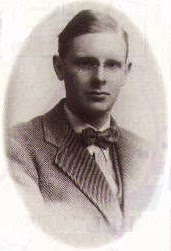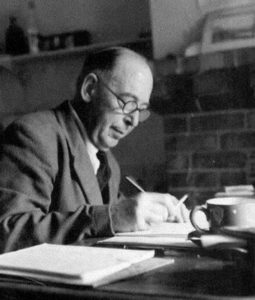Ambition! We must be careful what we mean by it. If it means the desire to get ahead of other people—which is what I think it does mean—then it is bad.
If it means simply wanting to do a thing well, then it is good. It isn’t wrong for an actor to want to act his part as well as it can possibly be acted, but the wish to have his name in bigger type than the other actors is a bad one.
Thus wrote C. S. Lewis in a 1944 essay, “Answers to Questions on Christianity.” Written after the phenomenal success of The Screwtape Letters, his well-received novel Perelandra, and during his prominence with BBC broadcasts that were later turned into Mere Christianity, one might say that he was reminding himself not to get too proud of being recognized as a great writer.
The desire to succeed had been a driving force in Lewis’s life prior to his conversion. He desperately wanted to be known as an insightful poet. Yet his books of poetry never sold well.
 In 1930, about the time God was getting hold of his life, he wrote a letter to his good friend Arthur Greeves that dealt with the subject of literary ambition. It seems to have been a response to Greeves’s hopes with his own writing. Lewis shared the dangers of making that ambition central to one’s life.
In 1930, about the time God was getting hold of his life, he wrote a letter to his good friend Arthur Greeves that dealt with the subject of literary ambition. It seems to have been a response to Greeves’s hopes with his own writing. Lewis shared the dangers of making that ambition central to one’s life.
“From the age of sixteen onwards I had one single ambition [to succeed as a writer], from which I never wavered,” he told Greeves. He prosecuted that ambition with “every ounce” of himself, and upon its achievement he staked his entire “contentment.” His conclusion? “I recognise myself as having unmistakably failed in it.”
This is the pre-successful Lewis speaking, of course, but it shows that he had to get this part of his thinking straightened out before God was able to use him for His purposes.
“The side of me which longs, not to write, for no one can stop us doing that, but to be approved as a writer, is not the side of us that is really worth much,” he counseled.
And depend upon it, unless God has abandoned us, he will find means to cauterise that side somehow or other. If we can take the pain well and truly now and by it forever get over the wish to be distinguished beyond our fellows, well: if not we shall get it again in some other form.
Lewis, in this letter, is helping Greeves get to the point he has reached: set aside the goal of being well-known and “approved” by others. Only when we do that are we really free to be what God wants us to be.
And honestly, the being cured, with all the pain, has pleasure too: one creeps home, tired and bruised, into a state of mind that is really restful, when all one’s ambitions have been given up. Then one can really for the first time say “Thy Kingdom come”: for in that Kingdom there will be no pre-eminences and a man must have reached the stage of not caring two straws about his own status before he can enter it.
 Lewis then projects into a possible future for someone who hasn’t learned this lesson early on. “Think how difficult that would be if one succeeded as a writer,” he mused, and then “how bitter this necessary purgation at the age of sixty, when literary success had made your whole life and you had then got to begin to go through the stage of seeing it all as dust and ashes.”
Lewis then projects into a possible future for someone who hasn’t learned this lesson early on. “Think how difficult that would be if one succeeded as a writer,” he mused, and then “how bitter this necessary purgation at the age of sixty, when literary success had made your whole life and you had then got to begin to go through the stage of seeing it all as dust and ashes.”
Far better to learn this lesson at an early age than to have to try to learn it when one is less open to such lessons later in life. He concludes his counsel to Greeves with these words:
I would have given almost anything—I shudder to think what I would have given if I had been allowed—to be a successful writer. . . . I am writing as I do simply & solely because I think the only thing for you to do is absolutely to kill the part of you that wants success.
Why do I focus on this particular topic today? Well, it’s because it hits home with me personally. While my early life was not one of seeking literary success, as I’ve progressed as a university professor and scholar, I’ve seen that desire Lewis talks about rise up in me.
I think I had too grandiose dreams about how something I’ve written would take the world by storm. Surely everyone who is anyone will want to know about Noah Webster. How could anyone with any political interest not want to read a book about the impeachment of Bill Clinton? Won’t all sincere Christians eagerly delve into a volume that provides guidance on the Biblical principles for political involvement?
More recently, I harbored the hope that an analysis of a famous president, Ronald Reagan, and a less-famous but highly influential man, Whittaker Chambers, would attract a large audience. And a book on C. S. Lewis? Why, it should be a national bestseller, right?
Don’t get me wrong. I believe with all my heart that God wanted me to write these books. But His idea of success may not be the same as mine. Was I faithful in my research and writing? Did I say what He wanted me to say? If so, I am to rest and find contentment in that.
Perhaps the things I have written (and continue to write in this blog) will help a number of individuals over time. If anything I write leads a person to consider more seriously one’s relationship with the Lord and others, I rejoice.
Here’s where my heart needs to be: may God be glorified in everything I do.
